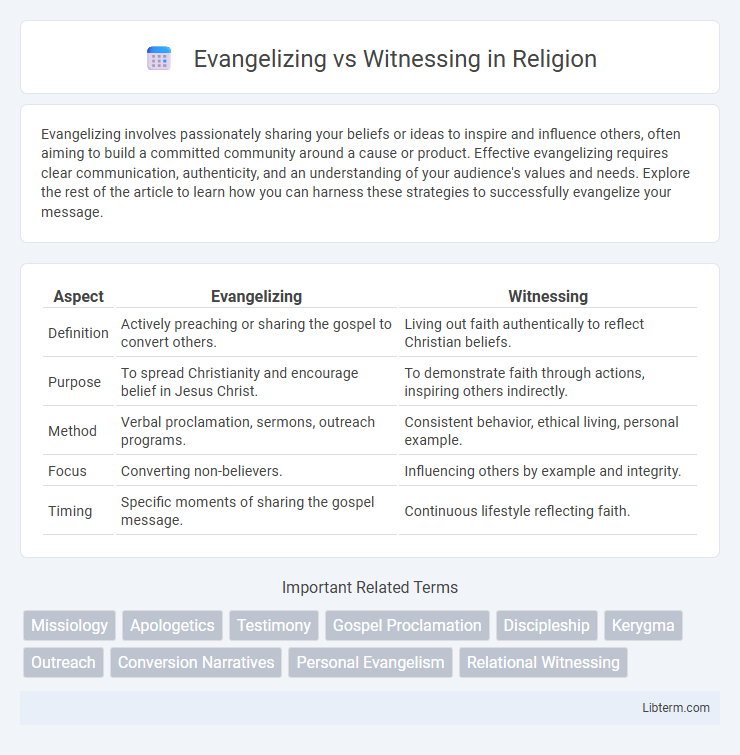Evangelizing involves passionately sharing your beliefs or ideas to inspire and influence others, often aiming to build a committed community around a cause or product. Effective evangelizing requires clear communication, authenticity, and an understanding of your audience's values and needs. Explore the rest of the article to learn how you can harness these strategies to successfully evangelize your message.
Table of Comparison
| Aspect | Evangelizing | Witnessing |
|---|---|---|
| Definition | Actively preaching or sharing the gospel to convert others. | Living out faith authentically to reflect Christian beliefs. |
| Purpose | To spread Christianity and encourage belief in Jesus Christ. | To demonstrate faith through actions, inspiring others indirectly. |
| Method | Verbal proclamation, sermons, outreach programs. | Consistent behavior, ethical living, personal example. |
| Focus | Converting non-believers. | Influencing others by example and integrity. |
| Timing | Specific moments of sharing the gospel message. | Continuous lifestyle reflecting faith. |
Defining Evangelizing: Sharing the Good News
Evangelizing involves actively sharing the Good News of Jesus Christ with others to inspire faith and transformation. It encompasses communicating the core message of salvation, grace, and redemption found in the Gospel. This intentional proclamation aims to reach non-believers and encourage a personal relationship with Christ.
What is Witnessing? Personal Testimonies of Faith
Witnessing involves sharing personal testimonies of faith to demonstrate the transformative power of belief and create genuine connections with others. It emphasizes authentic experiences and relatable stories that highlight how faith impacts daily life and inspires hope. These personal accounts serve as powerful tools for encouraging others to explore spirituality and deepen their own faith journey.
Key Differences Between Evangelizing and Witnessing
Evangelizing involves actively sharing the gospel message with the intention of converting others, emphasizing persuasion and outreach to non-believers. Witnessing focuses on living a consistent Christian life that exemplifies faith through actions and personal testimony, allowing the Spirit to work in others organically. The key difference lies in evangelizing as proactive communication, while witnessing centers on authentic demonstration of faith.
Biblical Foundations of Evangelism and Witnessing
Biblical foundations of evangelism emphasize the Great Commission in Matthew 28:19-20, where Jesus commands believers to make disciples of all nations, highlighting evangelism as proactive sharing of the gospel. Witnessing, rooted in scriptures like Acts 1:8, involves testifying to Christ's transformative power through personal experience and the Holy Spirit's empowerment. Both practices are integral to fulfilling Jesus' mandate, with evangelism focusing on outreach and witnessing underscoring authentic, Spirit-led testimony.
The Role of the Holy Spirit in Evangelizing and Witnessing
The Holy Spirit empowers believers to effectively evangelize by guiding their words and opening hearts to receive the Gospel message. In witnessing, the Holy Spirit confirms the truth through personal testimony and spiritual conviction, enabling authentic expression of faith. Both evangelizing and witnessing rely on the Holy Spirit's active presence to transform lives and draw individuals toward Christ.
Methods of Evangelizing: Approaches and Strategies
Methods of evangelizing encompass diverse approaches such as relational evangelism, which emphasizes building authentic relationships to share faith naturally, and mass evangelism that relies on large-scale events to reach broad audiences. Strategic use of digital media platforms enables targeted message dissemination, while personal storytelling and testimonies foster emotional connections that enhance receptivity. Contextualization of the gospel message according to cultural sensitivity ensures higher engagement and effectiveness in various demographic groups.
Effective Witnessing: Sharing Your Faith Story
Effective witnessing involves sharing your personal faith story with sincerity and clarity to create genuine connections. Emphasizing specific transformative experiences and the impact of faith in daily life makes testimony relatable and compelling. Using heartfelt narratives rooted in scripture strengthens credibility and invites meaningful spiritual conversations.
Common Misconceptions About Evangelizing and Witnessing
Many people mistakenly believe evangelizing involves aggressive persuasion, while witnessing is often seen as only sharing personal experiences without intent to convert. Evangelizing actually encompasses sharing the gospel message clearly and lovingly, whereas witnessing includes both living out one's faith authentically and verbally sharing testimony. Understanding these distinctions helps clarify that both practices are essential yet complementary components of Christian outreach.
Challenges and Opportunities in Modern Evangelism
Evangelizing faces challenges such as cultural resistance, digital distraction, and skepticism towards organized religion, requiring innovative approaches to communication and message delivery. Witnessing offers opportunities for authentic personal connection through lived experiences, fostering trust and relatability in diverse communities. Modern evangelism benefits from integrating social media, storytelling, and contextual sensitivity to overcome barriers and engage a broader, more secular audience effectively.
Integrating Evangelizing and Witnessing in Daily Life
Integrating evangelizing and witnessing in daily life involves actively sharing faith through personal actions and conversations, demonstrating Christ's love in tangible ways. Consistent authentic living aligned with Christian values creates natural opportunities for witnessing, while intentional moments of sharing the gospel message foster evangelizing effectiveness. Building genuine relationships enhances influence, making both evangelizing and witnessing seamless parts of everyday interactions.
Evangelizing Infographic

 libterm.com
libterm.com